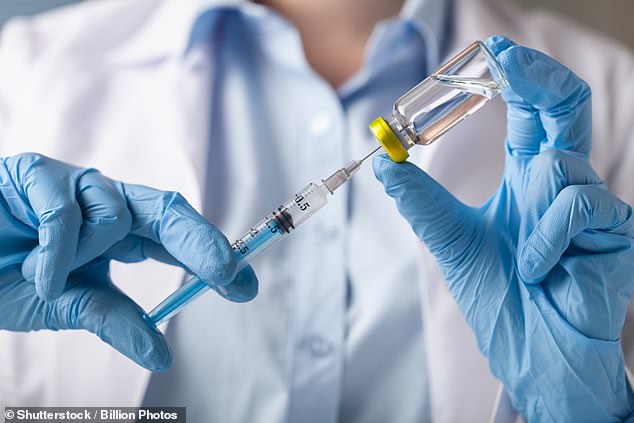As Covid restrictions ease and the number of people vaccinated in the UK continues to rise, it feels as though the end of the pandemic is within sight.
But speak to any scientist and they will tell you that it is far from over.
In fact, an outbreak of a different member of the coronavirus family of viruses is ‘inevitable’, owing to a confluence of environmental and lifestyle factors such as fast travel and large cities, says Ted Schenkelberg, co-founder of the Human Vaccines Project, an international research organisation based in New York.
‘We are living in a world that is ripe for pandemics,’ he warns.
But could the solution be a universal vaccine — a single jab that would offer protection against Covid-19, all its variants and all members of the coronavirus family?
The virus that causes Covid-19, SARS-CoV-2, is the third coronavirus to jump from animals to humans in the past two decades.
In 2002, SARS (severe acute respiratory syndrome) emerged in China, infecting more than 8,000 people and killing 774. Then, in 2012, MERS (Middle East respiratory syndrome) appeared in Saudi Arabia, killing 881 people worldwide.

With all coronaviruses having some common characteristics, this scientific Holy Grail is potentially within grasp, and research has begun [File photo]
With 198 million cases of Covid-19 worldwide and more than 4.2 million deaths (with 5.88 million cases and nearly 130,000 deaths in the UK), no one wants a repeat of the latest outbreak, or worse.
SARS and MERS were less infectious than Covid-19 but far more deadly (the latter killed a third of those infected), and the fear is a future strain could combine the easy transmission of Covid-19 and the lethality of MERS.
A single, universal coronavirus vaccine is a big ask: we are still working on getting the vaccine right for SARS-CoV-2, and the new strains of it that are emerging, never mind the whole family of coronaviruses.
But with all coronaviruses having some common characteristics, this scientific Holy Grail is potentially within grasp, and research has begun.
Earlier this year, the Coalition for Epidemic Preparedness Innovations (CEPI), a global partnership developing vaccines against infectious diseases, launched a £2.5 billion five-year plan to ‘reduce or even eliminate the future risk of pandemics’.
The new drive includes a £24 million partnership with VBI Vaccines, a U.S. company, to develop a jab against all SARS-CoV-2 variants, including the South African and Brazilian strains which are thought to be more transmissible and deadly. CEPI, which has received £276 million in funding from the UK government, is also seeking proposals from researchers working on ‘all-in-one’ vaccines that could protect against a broad range of coronaviruses including SARS, MERS and Covid-19.
‘SARS-CoV-2 is highly unlikely to be the last coronavirus,’ says Dr Richard Hatchett, chief executive of CEPI.
‘We know from history that additional coronaviruses will almost certainly cross from animals to humans again and cause disease,’ says Ted Schenkelberg, who has a background in infectious disease and worked on HIV vaccine programmes. ‘Scientists are really worried about the next coronavirus — SARS X — and what it is going to be.
‘The idea of a universal vaccine is that it would work across any of the known coronaviruses, or any others that are lurking in animal reservoirs.
‘Ideally, we want to be in a position where we have vaccines in storage before an outbreak occurs; or, better still, already have people vaccinated so that they’re protected prior to the next pandemic.’
To create a universal vaccine, scientists must focus on common characteristics and structures between coronaviruses and then ‘exploit’ them.
One approach being investigated is targeting the core of the virus, not just the trademark spike protein (the way coronaviruses gain entry into a cell, and the target of existing vaccines).
Scientists at Nottingham University and the UK company Scancell are developing a universal Covid-19 vaccine which, as well as the surface spikes, targets a protein in the core of the virus which is far less likely to mutate.
Human trials are expected to start this year after positive results on mice showed the formula can induce an immune response. Biotech companies in Belgium and France are working on similar jabs.
Computer modelling and artificial intelligence could dramatically speed up the process of identifying other structural ‘weaknesses’, says Schenkelberg.
‘We can use science to understand which coronaviruses are going to be a threat to humans, as well as which immune responses are most protective, helping scientists design vaccines that protect against new threats,’ he told Good Health.
But others are not so hopeful. ‘Yes, we should be looking for a universal coronavirus vaccine, but that doesn’t mean it will be easy to develop,’ says Dr Chris Smith, a consultant virologist, lecturer at Cambridge University and presenter of The Naked Scientists radio show.
‘Viruses are tough customers. They “know” where their Achilles heels are and they disguise the bits of the virus that don’t change very much between different strains to actively safeguard and protect themselves. That makes it much more difficult to exploit those vulnerabilities.’
‘So while I believe in the power of science, these are tough nuts to crack and sometimes it is easier, cheaper, safer and speedier to go for the lower-hanging fruit, regularly updating vaccines we do have, like we do for the flu.’
Vaccines aren’t our only option. As Schenkelberg explains: ‘We can do things differently to reduce the chance of another epidemic. We need better stewardship of the environment and surveillance of viruses in animals, so we know what coronaviruses are circulating. We can’t flip back into complacency. We can’t go through 2020 again.’
Source link : https://www.dailymail.co.uk/health/article-9853221/The-super-universal-vaccine-fight-coronavirus.html











